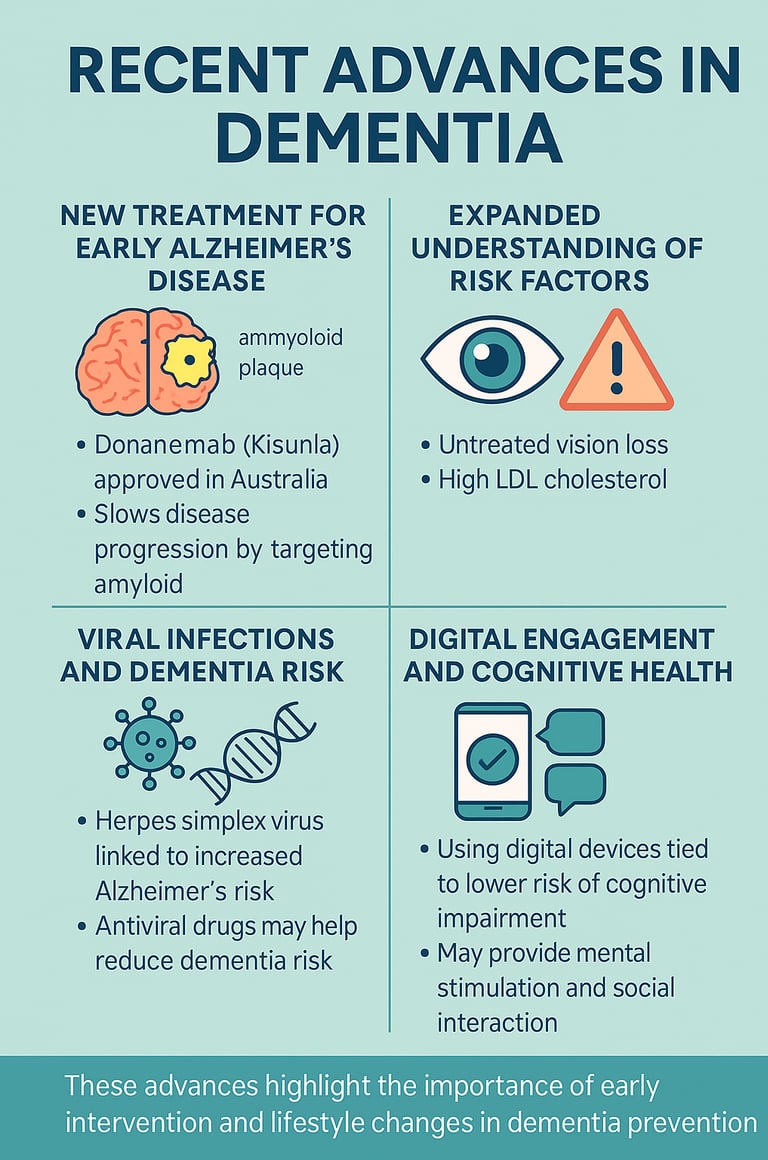New Treatments for Early Alzheimer’s Disease
Australia has approved donanemab (marketed as Kisunla), a drug developed by Eli Lilly, for treating early symptomatic Alzheimer's disease in adults with a specific genetic profile. This is the first Alzheimer’s treatment in 25 years that slows disease progression by targeting amyloid proteins in the brain. Administered intravenously every four weeks for up to 18 months, the drug may slow cognitive decline by about one-third
6/4/20252 min read


Australia has approved donanemab (marketed as Kisunla), a drug developed by Eli Lilly, for treating early symptomatic Alzheimer's disease in adults with a specific genetic profile. This is the first Alzheimer’s treatment in 25 years that slows disease progression by targeting amyloid proteins in the brain. Administered intravenously every four weeks for up to 18 months, the drug may slow cognitive decline by about one-third. However, eligibility is limited to certain patients due to strict criteria, including early-stage diagnosis and specific genetic markers. PubMed Central+3The Guardian+3news+3
🔬 Expanded Understanding of Dementia Risk Factors
The 2024 update of the Lancet Commission on dementia prevention added two new modifiable risk factors:Healio+6The Lancet+6| The Official Publication of LearningRx+6
Untreated vision loss: Conditions like cataracts and diabetic retinopathy have been linked to a higher risk of dementia. Correcting vision issues may reduce this risk. WebMDbrainhealthbreakthroughs.com
High LDL cholesterol: Elevated levels of "bad" cholesterol in midlife are associated with an increased risk of dementia. Managing cholesterol through lifestyle changes or medication could be beneficial. Scimex
With these additions, there are now 14 identified modifiable risk factors for dementia, and addressing them could potentially prevent or delay up to 45% of cases globally. Alzheimer Scotland+2Scimex+2The Lancet+2
🦠 Viral Infections and Dementia Risk
Emerging research suggests a link between herpes simplex virus type 1 (HSV-1), commonly responsible for cold sores, and an increased risk of Alzheimer's disease. A study found that individuals infected with HSV-1 had an 80% higher risk of developing Alzheimer's. However, those who took antiviral medications showed a 17% reduction in this risk, indicating that managing HSV-1 infections might be a potential strategy for reducing Alzheimer's risk. nypost.com+1The Scottish Sun+1The Scottish Sun
📱 Digital Engagement and Cognitive Health
Contrary to concerns about digital technology harming brain function, a recent study published in Nature Human Behavior found that engagement with digital technology correlates with a 58% reduced risk of cognitive impairment in middle-aged and older adults. Utilizing devices like smartphones and tablets for activities such as messaging, using apps, or browsing the internet may help preserve cognitive abilities by providing mental stimulation and facilitating social interaction. The Washington Post
These developments underscore the importance of early intervention, lifestyle modifications, and embracing technology in the fight against dementia.
Contact us:
